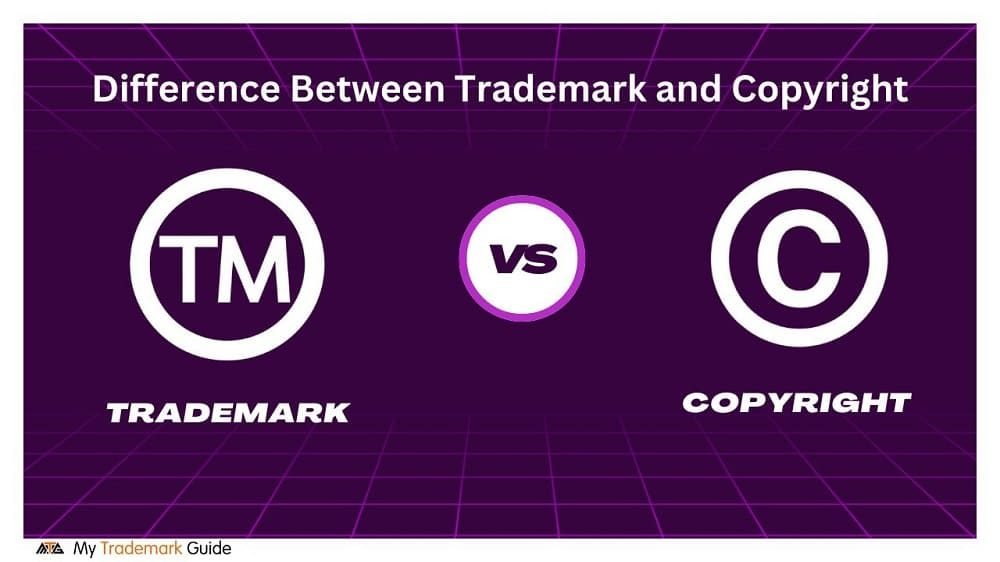Difference Between Trademark and Copyright

Introduction
There are different type of Intellectual Property Rights protection in India. Understanding the difference between trademarks and copyrights is crucial for protecting your intellectual property effectively. While both offer legal protections, they serve different purposes and apply to different types of creations. This article will break down the distinction between trademarks and copyrights in a simple manner.
What is a Trademark?
A trademark is a symbol, word, phrase, design, or combination of these that identifies and distinguishes the source of goods or services of a person or entity. Trademarks protect brand identity by preventing others from using similar marks that may confuse consumers about the origin of products or services.
Examples:
- The Nike “Swoosh” logo
- Apple’s bitten apple logo
- McDonald’s “Golden Arches”
What is a Copyright?
Copyright is a legal right that grants the creator of original works of authorship exclusive rights to their use and distribution, typically for a limited time. Copyright protects literary, dramatic, musical, and artistic works, ensuring creators can control and profit from their creations.
Examples:
- Books, poems, and articles
- Movies and TV shows
- Music compositions and recordings
- Paintings and sculptures
Trademark Vs Copyright
The following table covers in detail the differences between trademark and copyright:
Sl No. | Particular | Trademark | Copyright |
1 | Scope of Protection | Protect brand names, logos, taglines, slogans and other symbols that help in identification of the source of goods or services. | Protect original works of authors and creators such as books, music, photos and artwork. |
2 | Purpose | A Trademark ensures that a consumer can identify the origin of products and services, protecting against confusion and brand dilution. | A Copyright protects the expression of ideas, ensuring creators can control and benefit from their works. |
3 | Applicant | Trademark registration can be applied by any person or entity for their brand or logo which is to be used in respect of their goods or services. | Copyrights can be applied by any author, music composer, producer, director, software developer, photographer etc for their original work. |
4 | Duration | A Trademark registration is valid for a time period of 10 years from the date of application. A Trademark registration can last indefinitely if it is in continuous use and renewed as required. | Copyright registration is valid during the lifetime of an author. After the death of the author, registration is valid for 60 years from the year after the author’s death. |
5 | Relevant Act | Trademarks are governed under Trade Marks Act, 1999. | Copyrights are governed under Copyright Act, 1957. |
6 | Examples of Use | Trademarks are used on products, packaging, advertising and promotional materials to signify the source of goods or services. | Applied to creative works like literature, music, art, and films, protecting the content from unauthorized use. |
7 | Symbol | When a trademark application is filed but not registered, the term ™ can be affixed with the brand name. When a trademark application is registered the Ⓡ symbol can be affixed. | When a copyright in respect of a particular work is registered, the © symbol can be used on the work copyrighted. |
8 | Registering Authority | Trademark application is to be submitted to Controller General of Patents, Designs, and Trademarks for registration. | Copyright application is to be submitted to Copyright office under Department for Promotion of Industry and Internal Trade. |
Why Understanding the Difference Between Trademark and Copyright Matters
Knowing the difference between trademarks and copyrights helps you effectively protect your intellectual property. Trademarks safeguard your brand identity, ensuring consumers can distinguish your products and services from others. Copyrights protect your creative works, allowing you to control and profit from your original creations. Sometimes you need to get both registrations for a similar work like you may need to get the name of a movie registered under trademark and the movie work itself will be protected through copyright.
Conclusion
In summary, trademarks and copyrights serve distinct purposes in protecting intellectual property. Trademarks secure brand identity by protecting names, logos, and slogans, while copyrights protect original works of authorship, such as books, music, and art. Understanding these differences is key to ensuring your intellectual property is adequately protected.
Contact us now to know more about trademark and its registration.




